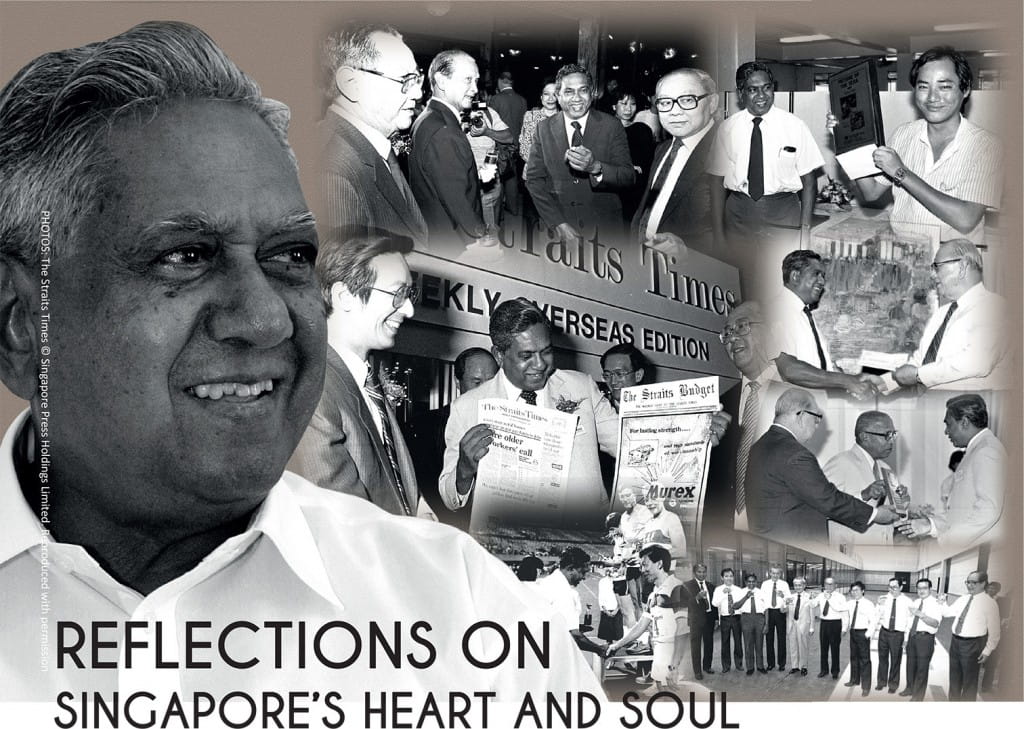
S.R. Nathan became the President of Singapore on 1st September 1999. With two terms (12 years) in office, he is Singapore’s longest-serving President.
Former president S.R. Nathan reflects on his life and his influence in shaping Singapore as a nation that cares. He shares his thoughts on how caring Singaporeans make good citizen ambassadors and what it takes for Singapore to succeed in the future.
By Kim Lee
n the 1930s, when Singapore was still under British rule, a young Indian boy, whom we now know as Singapore’s former President S.R. Nathan, lost his father. Life became much tougher for him and his family. He then ran away from home when he was a teenager to become a hawker’s assistant.
The uneducated child could not see a better life for himself. Ironically, the Japanese Occupation of Singapore (1942-1945) delivered him from that notion. During that time, he got to know some Japanese officers, one of whom told him that he had a “good head on his shoulders”. It instilled in him confidence, and he picked up Japanese and found work as an interpreter, eventually working for the top officer in the Japanese civilian police.
After World War II, Nathan decided to pursue his studies, reading social work at the University of Malaya under a bursary from petroleum conglomerate Shell.
He started work as a medical social worker with the Singapore Civil Service, and was seconded to the Labour Research Unit as its Assistant Director, dealing with labour unrest and industrial negotiations.
Later, he moved between key positions in high-profile ministries that included being Deputy Secretary with the Ministry of Foreign Affairs, as Director of the Security and Intelligence Division (SID) under the Ministry of Defence. His storied life through these key positions, from poverty to the highest office of the land, is told in his memoir, An Unexpected Journey: Path to the Presidency, published in 2011. Nathan recently launched a new book, In Conversation that talks about Singapore’s pioneer years and the nation’s significant achievements.
After he retired from the civil service, in 1981, he became the Executive Chairman of The Straits Times (Singapore’s English language daily) and then ambassador to the United States, after which he was Singapore’s Ambassador-at-Large. His career culminated with him being elected Singapore’s sixth President, a post he held from 1 September 1999 to 31 August 2011.
Nathan turned 90 in 2014, and, in an interview with Singapore magazine, he reflects on the changes Singapore has gone through, gives his take on people diplomacy and the role citizens can play in the global community.
“I am very pleased that many young people are travelling abroad to give help, and this is often unheralded, like doctors who work in other countries and don’t publicise their activity. These are good traits of ours, which I am sure will remain in the memories of the people who have benefitted from them.”
— S.R. Nathan
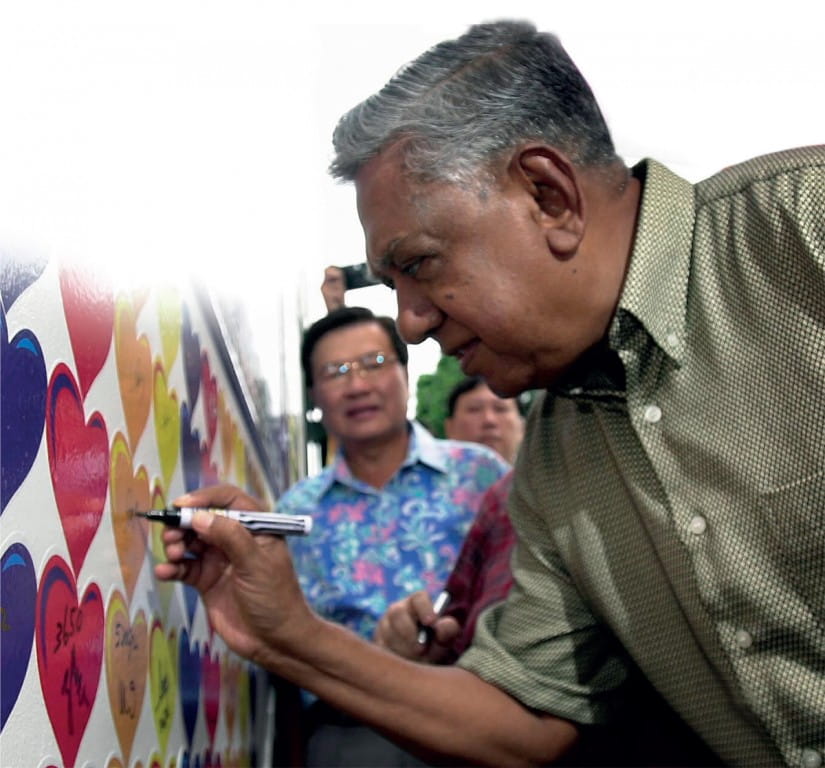
S.R. Nathan signing heart-shaped stickers on a bus at the Istana (The Presidential Palace) open house during one of Singapore’s National Day celebrations.
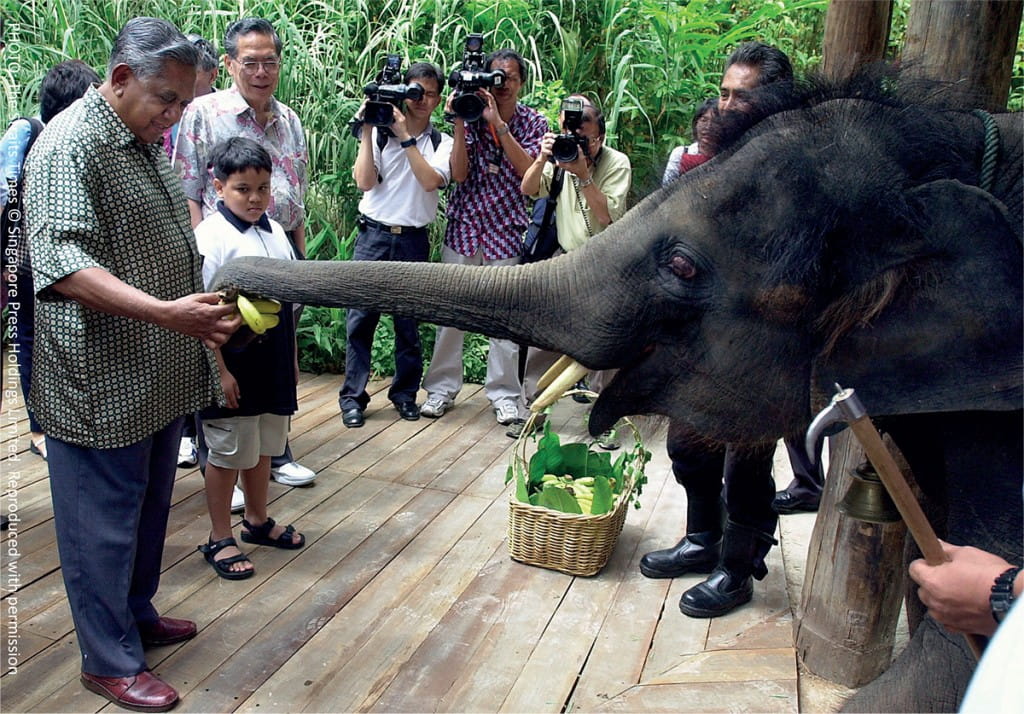
S.R. Nathan feeds an elephant while his grandson Kiron Cheong (on his left) watches during a visit to the Singapore Zoological Gardens. Standing behind Cheong is Kwa Soon Bee, Wildlife Reserves Singapore’s Chairman.
“This is one of the strengths we have — that we can co-exist with one another, that we respect and have awareness of each other’s faith and religion.”
— S.R. Nathan
SG: Of the many friendships you have made with international leaders, is there an instance of how these relationships have made a difference to Singapore’s ties?
Nathan: Some 40 years ago, I went to Sri Lanka to meet a friend at the Non-Aligned Movement Summit (a meeting of states that are not formally aligned with or against any major power bloc). I sat with him and talked. I wanted to know if the Vietnamese Prime Minister who had come to Colombo before the Non-Aligned meeting had any interesting messages. I asked my friend what transpired. He didn’t tell me. What he did was to leave some papers (on our table) and said, “I’m going to the gents. I’ll be back.” He did not ask me to read the papers but it was obvious he was letting me know what happened. From that, we knew what Vietnam’s stand was — a revolution for Southeast Asia. It was an early warning.
SG: What shaped your perspective towards life, values and work ethics? Is it still relevant to Singaporeans and the world we live in today?
Nathan: My mother used to tell me, “Do your duty and don’t balance it against your reward.” That is important in the Hindu heritage. That’s what I have done all this time. I think most of us should do that. We were brought up in cultures that have certain values which are not recorded in print but have been carried from generation to generation and have stood the test of time. I think the values we had in those days are still values we must cherish. One of the reasons we study our mother tongue is for our heritage, and this is a value we must keep.
SG: What are your thoughts on people-to-people cross-cultural relationships?
Nathan: This is one of the strengths we have — that we can co-exist with one another, that we respect and have awareness of each other’s faith and religion. This is now being threatened by individualism, while this may be a strong cultural trait in the West, this characteristic may not be suitable for all. Mutual tolerance has allowed our multi-cultural society to flourish. We don’t want to destroy that.
SG: How have Singapore International Volunteers (SIV) helped bridge Singaporeans and world communities and nurtured relationships?
Nathan: First, I am very pleased that many young people are travelling abroad to give help, and this is often unheralded, like doctors who work in other countries and don’t publicise their activity. These are good traits of ours, which I am sure will remain in the memories of the people who have benefitted from them. There is a bond between those who do the good and the people who receive the benefits of what they give.
SG: What are your views of citizen ambassadors?
Nathan: There are two kinds. Ambassadors who have pride in being from Singapore, in Singaporean characteristics of kindness, of tolerance, of sharing — that’s the good side. They are respectful of others, don’t throw their weight around, don’t look down on others just because they are prosperous.
“They are respectful of others, don’t throw their weight around, don’t look down on others just because they are prosperous. There are those who go out into communities to help them. These caring people give a good image to Singaporeans.”
– S.R. Nathan on citizen ambassadors
These caring people give a good image to Singaporeans. By your behaviour, you show that you are a person with values. We also have bad ambassadors — those who flaunt their wealth, who think they can misbehave outside their borders. We should all remember that we are all ambassadors in somebody else’s home. We cannot behave (in other people’s homes) without showing regard to the feelings of those people.
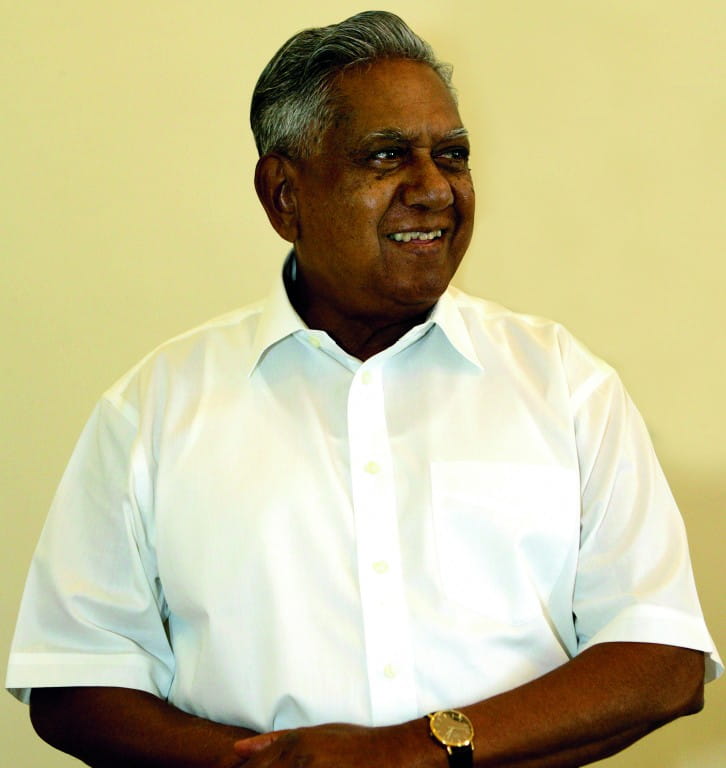
SG: What inspired you to come up with the annual charity fund-raising President’s Challenge?
Nathan: We have a commitment to our own people, which is why I started the President’s Challenge in 2000. It calls on everybody to make their contribution, not only in monetary terms but also in terms of effort. That was my purpose; that the whole community would embrace the problems of fellow citizens and see what we can do to help. I think it has raised the consciousness of people to the fact that there are others in our midst who need support.
SG: Your book, An Unexpected Journey documents your rise to presidency, as well as Singapore’s journey towards 50 years of independence. What lessons would you want the next generation of Singaporeans to take away from your book?
Nathan: I learnt a number of lessons from my unexpected journey. First is the capacity we all have as individuals to overcome problems that we face. Second is that there is good to be found in others — sometimes in unexpected quarters. For example, during World War II, I found among the Japanese soldiers a gentleman who would change my life. Before he left, he got me my first job and told my Japanese superior to take care of me.
Third, the importance of maintaining a moral compass — it will help us weather some of the storms and show us the path to righteousness. Next, we all have abilities within ourselves. It doesn’t mean that just because you are not qualified, you don’t have ability. You may have latent abilities people may not have seen. Also, in life, there are always opportunities, and we must value the opportunities that circumstances give us. Don’t give up, however bad a hand you have received.
SG: Do you consider Singapore more a thought-leader or trail-blazer today than in its immediate post-independence years? How do you think Singapore has benefitted others in this role?
Nathan: I think we are more so a trailblazer today than we were in our pioneering years. We came into existence as a country overnight, we had a lot of hostilities around us, and, today, we are accepted as an equal, as a sovereign state. There are various instances where we contribute to discussion of regional or international law, or international problems. They may not directly affect us, yet we are thinking about them. Tommy Koh’s (Professor of Law, National University of Singapore and Ambassador-At-Large at the Ministry of Foreign Affairs) contributions have been immense in this regard with the Law of the Sea (an international treaty by which governments maintain peace and public order at sea) and so on. Beyond that, there are others in Singapore who provide thinking to problems, like Kishore Mahbubani (Dean and Professor in the Practice of Public Policy of the Lee Kuan Yew School of Public Policy). Kishore is a thinker. He doesn’t worry whether you agree with him or whether you don’t. If something strikes him as good for the country or the people, he speaks his mind. He is not deterred by the reaction he is going to get. And by his way of expression, he gets other people to think about it. Whether we solve these issues, we are endeavouring to contribute ideas, and I think that is where we are a leader. In the early years of our founding, our existence was in doubt. I don’t think anybody was inclined to listen to us.
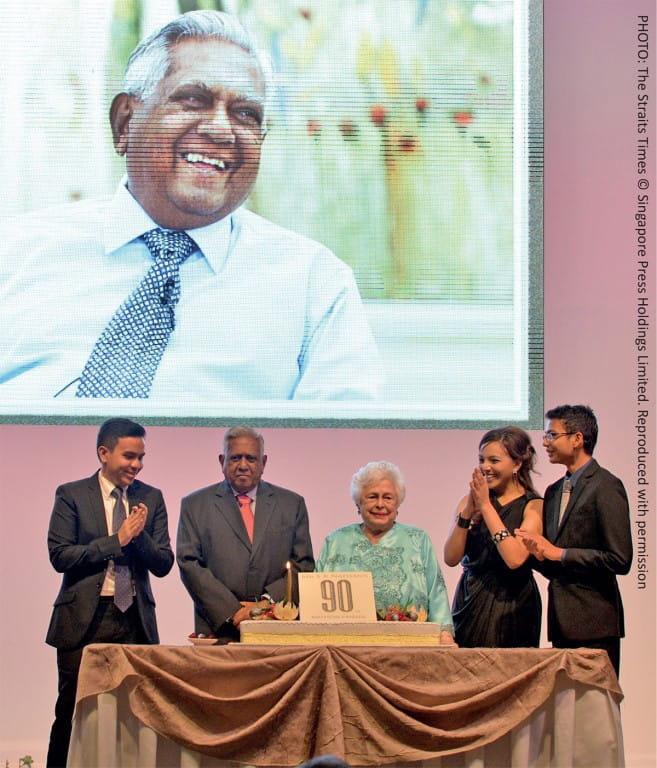
Former Singapore president S.R. Nathan recently celebrated his 90th birthday in July 2014. At the cake cutting ceremony, his wife and their grandchildren (from left) Kiron Cheong, Monisha Cheong and Keshin Cheong were part of the joyous occasion.
SG: How do you define the heart and soul of Singapore, and how should we protect it?
Nathan: I’m more worried about losing the soul that we have. Just because we are affluent, just because our lifestyle has changed, just because we are speaking in English, we cannot disown ourselves. Our soul is not English, or American. Don’t be shy about being Chinese, Indian or Malay, or Christian, Hindu, Buddhist or Confucianist — all have values built over centuries and that are part of our soul, whatever we are. Our people must learn a bit more about our heritage, and not forget who and what we are. Just because we are modern, we should not discard all this in favour of individualism that modern
society advocates.
SG: Where would you like to see Singapore go from here?
Nathan: It is good to remind ourselves that all our success did not come like that. Firstly, we are economically successful, but we are also very, very vulnerable. We are very dependent on the outside, economically. If there is a world slump or if anybody boycotts us, then our economy will be in a state of collapse. Seriously, our nation is fragile. As a people, we are one, but we have many factors — language, religion, culture — and the harmony can be divided very easily.
We are a new country. I hope we will be conscious that we are still vulnerable and that we need to protect what we are. Fifty years is such a short time. In the next 50 years, we will have other imponderables. People tend to think of society’s progress as a linear road that must lead forward. No. Five steps forward, three steps backwards, two steps sideways…society does not evolve according to plan. We are a city at the crossroads of ideas, influenced by different cultures, facing a contradiction. What is most important is to have a conscience. That is the strength we must have.
